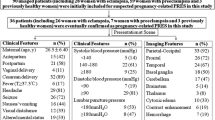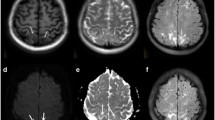Abstract
Introduction
Posterior reversible encephalopathy syndrome (PRES) and the related term reversible posterior leukoencephalopathy syndrome (RPLS) denote a constellation of clinical symptoms paired with key radiological findings. Eclampsia associated with PRES is a rare condition and remains a challenging diagnosis to make. There are only a few studies regarding PRES syndrome with a limited sample size. Our institution is a tertiary referral centre; hence, a good sample size of patients with eclampsia complicated with PRES syndrome is seen in our study. The objective was to identify the maternal and neonatal outcomes in PRES with eclampsia.
Methods
This study is a prospective observational study done in Government Medical College, Aurangabad, India from October 2018 to September 2020. In the present study, we have enrolled 63 cases, who satisfied inclusion and exclusion criteria during two years. All women admitted in the labour room of tertiary health care centre diagnosed with eclampsia with neurological symptoms during the study period were studied. Relevant data were obtained from the case file and compiled by common proforma. Analysis was done by SPSS (Statistical package for social sciences) Version 25th.
Results
In patients with a confirmed diagnosis of PRES with eclampsia(n = 63), the mean age of the patient was 20.74 ± 2.04 years, 23 (36.5%) patients had headache as premonitory symptoms, whereas 13(20.6%)patients had visual disturbances as the premonitory symptom. The mean gestational age at presentation was 34.4 ± 2 weeks. 40(63.5%) patients were showing parieto-occipital region changes, and 24(38.1%) subjects were showing only occipital region involvement in CT brain. 12 (19.04%) subjects were diagnosed with HELLP syndrome as a maternal complication, 07 (11.1%) subjects had Abruptio placentae. 26(41.3%) babies needed NICU admission, and 4 (6.3%) babies had neonatal death.
Conclusion
In pregnant patients presenting with seizure and neurological symptoms, a possibility of PRES should be considered. Proper diagnosis requires careful attention to clinical and radiographic presentation. In eclampsia with PRES patients, a timely intervention with anti-hypertensive, anti-cerebral oedema measures as well as management of other associated symptoms are required.
Similar content being viewed by others

References
Hinchey J, Chaves C, Appignani B, et al. A reversible posterior leukoencephalopathy syndrome. N Engl J Med. 1996;334:494–5002.
Mayama M, Uno K, Tano S, Yoshihara M, Ukai M, Kishigami Y, et al. Incidence of posterior reversible encephalopathy syndrome in eclamptic and women with preeclampsia with neurologic symptoms. Am J Obstet Gynecol. 2016;215:239.e1-239.e15.
Junewar V, Verma R, Sankhwar PL, et al. Neuroimaging features and predictors of outcome in eclamptic encephalopathy: a prospective observational study. AJNR Am J Neuroradiol. 2014;35:1728–34.
Alhilali LM, Reynolds AR, Fakhran S. A multi-disciplinary model of risk factors for fatal outcome in posterior reversible encephalopathy syndrome. J Neurol Sci. 2014;347:59–65.
Bartynski WS, Boardman JF. Distinct imaging patterns and lesion distribution in posterior reversible encephalopathy syndrome. Am J Neuroradiol. 2007;28(7):1320–7.
Brewer J, Owens MY, Wallace K, et al. Posterior reversible encephalopathy syndrome in 46 of 47 patients with eclampsia. Am J Obstet Gynecol. 2013;208:468.
Bembalgi S, Vishal Kamate S, Shruthi KR. A study of eclampsia cases associated with posterior reversible encephalopathy syndrome. J Clin Diagn Res. 2015;9(7):05–7.
Sardesai S, Dabade R, Deshmukh S, et al. Posterior reversible encephalopathy syndrome (PRES): evolving the mystery of eclampsia ! J Obstet Gynecol India. 2019;69:334–8.
Dora SK, Nayak L, Pande B, Dandapat AB. A prospective observational study for the evaluation of maternal and fetal outcome in patient with eclampsia. Int J Res Med Sci. 2017;5:1785–9.
Karanth S, Gonsalves K, Sheela CN, Mathew R, Sarma GRK, Phillip B, et al. Maternal and perinatal outcome in eclampsia complicated by posterior reversible encephalopathy syndrome; a three years’ experience in a tertiary care hospital. Int J Reprod Contracept Obstet Gynecol. 2017;6:5044–50.
Anjan T, Ankur S, Rakesha K. Posterior reversible encephalopathy syndrome. J of Obstet Anaesth Crit Care. 2014;4(2):50–2.
Chhabra A, Jagtap S. Postpartum seizures with posterior reversible encephalopathy syndrome following cesarean delivery for triplets. J Obstet Anaesth Crit Care. 2014;4(1):50–2.
Rodrigo P, Paul EM, Joseph V. Posterior reversible encephalopathy syndrome: a review. Crit Care Shock. 2009;12:135–43.
Hinchey J, Chaves C, Appignani B, Breen J, Pao L, Wang A, et al. A reversible posterior leukoencephalopathy syndrome. N Engl J Med. 1996;334(8):494–500.
Xuan H, Jinfeng X, Zao C, Guoliang L, Hong J. Posterior reversible encephalopathy syndrome with involvement of the cervical cord and medulla: a case report. J Clin Diagn Res. 2015;9(1):CD01-2.
Cipolla MJ, Sweet JG, Chan SL. Cerebral vascular adaptation to pregnancy and its role in the neurological complications of eclampsia. J Appl Physiol. 2011;110(2):329–39.
Vinod SP, Dhamangaonkar BR, Pattanshetti RC, Patil MM. Posterior reversible encephalopathy syndrome in early postpartum women: a case report. J Clin Diagn Res. 2014;8(4):RD01-2.
Sinha M, Sinha SK. Perinatal and maternal outcomes of eclampsia in Darbhanga District, Bihar, India. Int J Contemp Med Res. 2018;5(2):B1–4.
American College of Obstetricians and Gynecologists. (2015) Emergent therapy for acute-onset, severe hypertension with preeclampsia or eclampsia. ACOG Committee Opinion no. 623
Fisher N, Saraf S, Egbert N, Homel P, Stein EG, Minkoff H. Clinical correlates of posterior reversible encephalopathy syndrome in pregnancy. J Clin Hypertens. 2016;18(6):522–7.
Ibrahim NMAM, Manal EB. MRI imaging of posterior reversible encephalopathy syndrome associated with pregnancy. Egypt J Radiol Nucl Med. 2014;45(2):505–10.
Stevens CJ, Heran MKS. The many faces of posterior reversible encephalopathy syndrome. Br J of Radiol. 2012;85:1566–75.
Haque H, Thapa K. Maternal and fetal outcome in eclampsia: a study from tertiary care hospital. JNGMC. 2017;15(2):6–9.
Pannu D, Das B, Hazari P. Shilpa, Maternal and perinatal outcome in eclampsia and factors affecting the outcome: a study in North Indian population. Int J Reprod Contracept Obstet Gynecol. 2014;3(2):347–51.
Bernstein IM, Horbar JD, Badger GJ, Ohlsson A, Golan A. Morbidity and mortality among very-low-birth-weight neonates with intrauterine growth restriction. The vermont Oxford network. Am J Obstet Gynecol. 2000;182:198–206. https://doi.org/10.1016/S0002-9378(00)70513-8.
Kumari A, Mundle S, Fuse S. Maternal and neonatal outcome in eclampsia in a tertiary care hospital India. JMSCR. 2017;05(06):23522–33.
Konar H, Agarwal L, Priyanka P, Chaudhuri S. Management of posterior reversible syndrome in preeclamptic women. J Obstet Gynaecol India. 2021;71(3):318–21.
Fang X, Liang Y, Zhang W, Wang Q, Chen J, Chen J, Lin Y, Chen Y, Yu L, Wang H, Chen D. Serum neurofilament light: a potential diagnostic and prognostic biomarker in obstetric posterior reversible encephalopathy syndrome. Mol Neurobiol. 2021. https://doi.org/10.1007/s12035-021-02562-z.
Mai H, Liang Z, Chen Z, et al. MRI characteristics of brain edema in preeclampsia/eclampsia patients with posterior reversible encephalopathy syndrome. BMC Pregnancy Childbirth. 2021;21:669. https://doi.org/10.1186/s12884-021-04145.
Author information
Authors and Affiliations
Corresponding author
Ethics declarations
Conflict of interest
The authors report no conflict of intrest.
Ethical approval
Ethical comittee approval was obtained from the ethical committee of Govt Medical College, Aurangabad. (Pharma/IEC-GMCA/46/2018).
Additional information
Publisher's Note
Springer Nature remains neutral with regard to jurisdictional claims in published maps and institutional affiliations.
Varsha Deshmukh is a Professor at the Department of OBGY, GMC and Cancer Hospital, Aurangabad, Maharashtra, India; Vikas R Gangurde is Chief Resident, Department of OBGY, GMC, Aurangabad, Maharashtra, India.
Supplementary Information
Rights and permissions
About this article
Cite this article
Deshmukh, V., Gangurde, V.R. & Gadappa, S. Maternal and Perinatal Outcome of Posterior Reversible Encephalopathy Syndrome (PRES) in Patients with Eclampsia at Tertiary Health Care Centre. J Obstet Gynecol India 72 (Suppl 1), 192–197 (2022). https://doi.org/10.1007/s13224-021-01585-9
Received:
Accepted:
Published:
Issue Date:
DOI: https://doi.org/10.1007/s13224-021-01585-9



